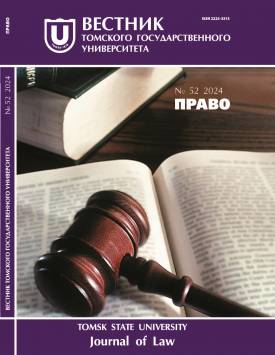Legal protection of ecological systems in Russia: theoretical issues
Natural ecological systems and biological diversity represent an important natural resource with ecological and economic value for all mankind. The quality of life on Earth depends on the state of ecosystems. The negative impact on ecosystems as a result of anthropogenic activities, the reduction or destruction of species of wild animals and plants leads to the degradation or death of ecosystems, large economic losses on a national and global scale. To preserve ecosystems, it is necessary to apply the principles of sustainable development. This will prevent a conflict between human activities for the conservation of biological diversity and its needs. Applying the provisions of the concept of sustainable development in practice, it is possible to explore the problems of preserving biological diversity, taking into account economic and social factors. The purpose of this article is to introduce the legal category "ecological systems" into scientific circulation, to determine their significance for humans, and to identify problems of their legal regulation. In the course of the study, the authors used scientific works by biologists and lawyers devoted to various aspects of the interscientific theory of the protection of ecological systems. The research was based on the norms of environmental legislation, as well as the provisions of the ecological and legal scientific doctrine. The methodological basis of the article is presented by separate philosophical, general scientific and private scientific research methods. Our work was aimed at studying the problems of finding a balance between the interests of nature and society, the needs of the population and the conservation of biodiversity. In the course of the study, the authors applied specific historical, logical methods, the method of analysis and synthesis. The chosen methodology is justified by the tasks of considering the genesis and current state of legal protection of ecosystems in Russian law. The article provides a scientific interpretation of the current environmental legislation, and offers suggestions for its improvement. The authors note that in the current environmental legislation, legal regulation is carried out only in relation to particularly valuable ecosystems. Meanwhile, having valuable properties for humans, each ecosystem and their totality requires special legal regulation. Therefore, it is argued that it is necessary to develop a legal category "national ecological network" in order to create a special legal regime for the core, ecological corridors and buffer zones, which will preserve biodiversity in the long term. Proposals are being made for a clearer legal consolidation of the habitat of wildlife and the protection of wetlands. The boundaries of the "ecosystem" category are also proposed, and critical comments are made about the proposal to grant them subjective rights. Based on the analysis of the provisions of legislation on environmental protection and environmental-legal doctrine, the authors argue that currently the mechanism of legal protection of ecosystems is poorly represented in Russian legislation. It is pointed out the need to develop criteria for ecosystem sustainability, the introduction of ecosystem monitoring and rationing, which will create a clear legal mechanism for the conservation and restoration of ecosystems by means of law. The authors declare no conflicts of interests.
Keywords
ecological system, biological diversity, rationing, monitoring, ecosystem approach, legal regulationAuthors
| Name | Organization | |
| Anisimov Alexey P. | Don State Technical University | anisimovap@mail.ru |
| Ivanova Svetlana V. | Orenburg Institute (branch) O.E. Kutafin Moscow State Law University | servis-05@list.ru |
References

Legal protection of ecological systems in Russia: theoretical issues | Tomsk State University Journal of Law. 2024. № 52. DOI: 10.17223/22253513/52/8
